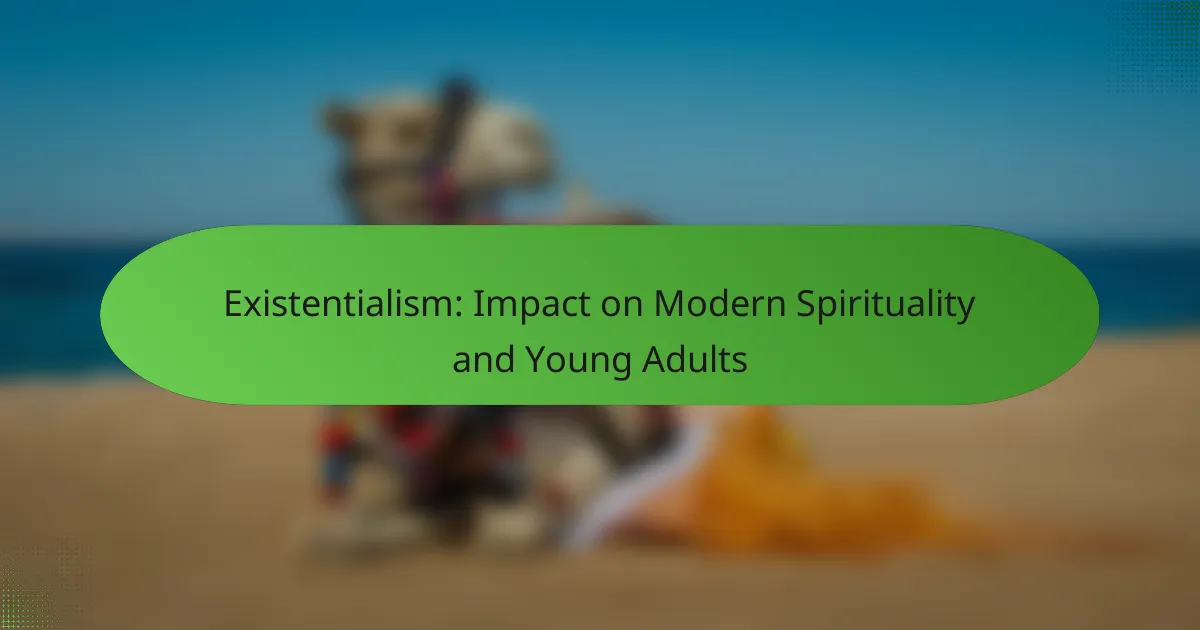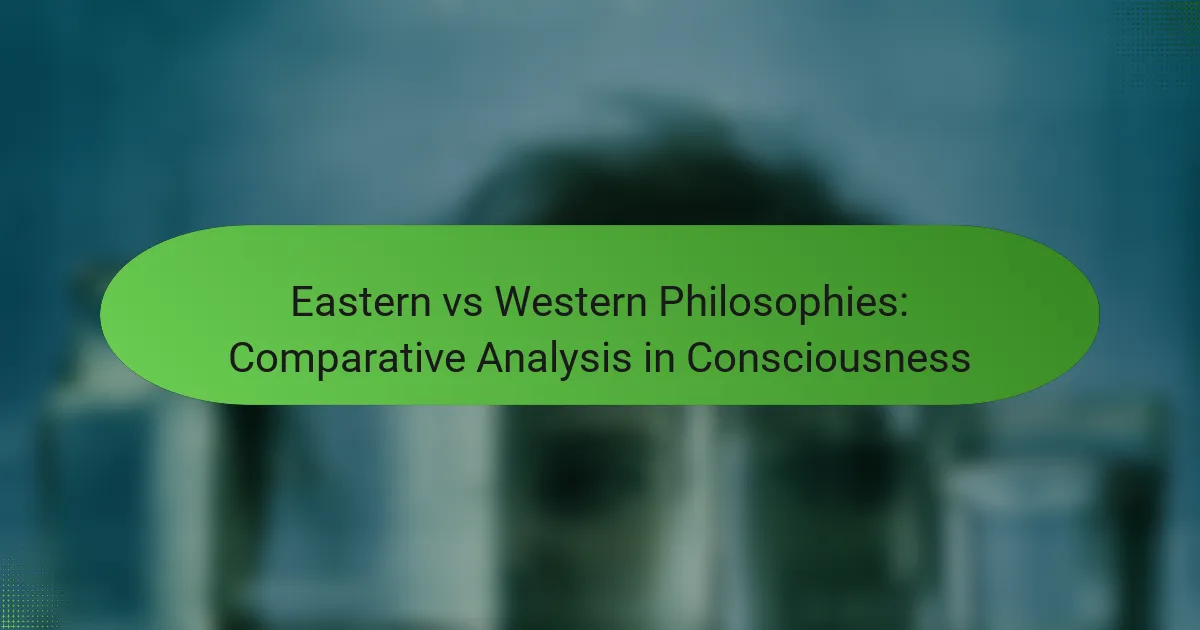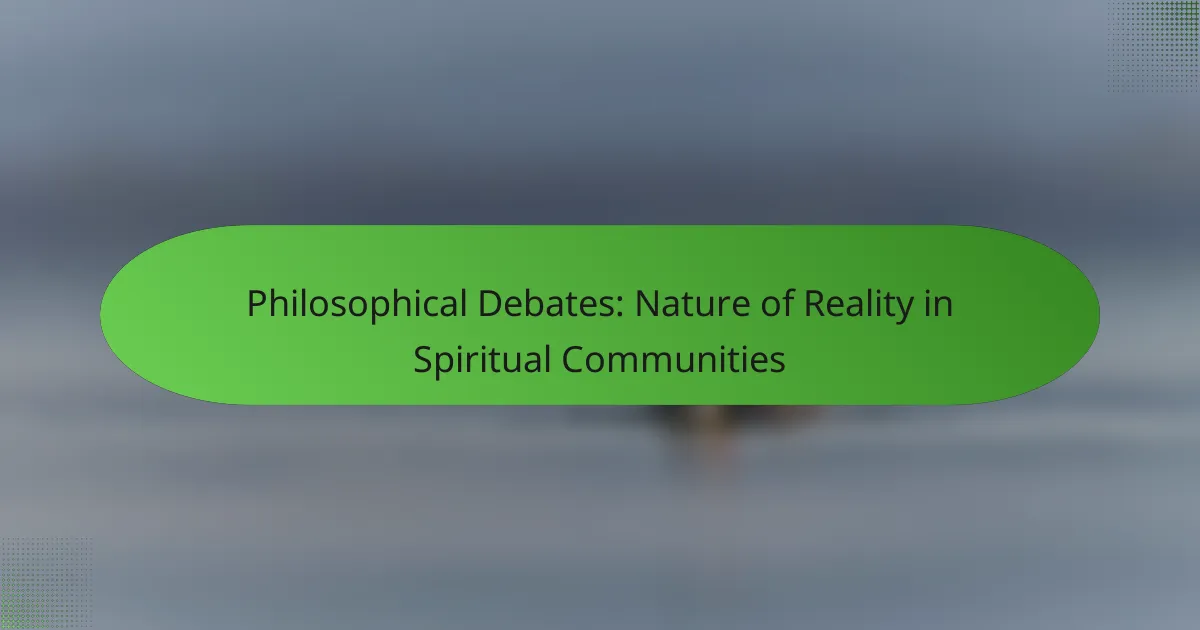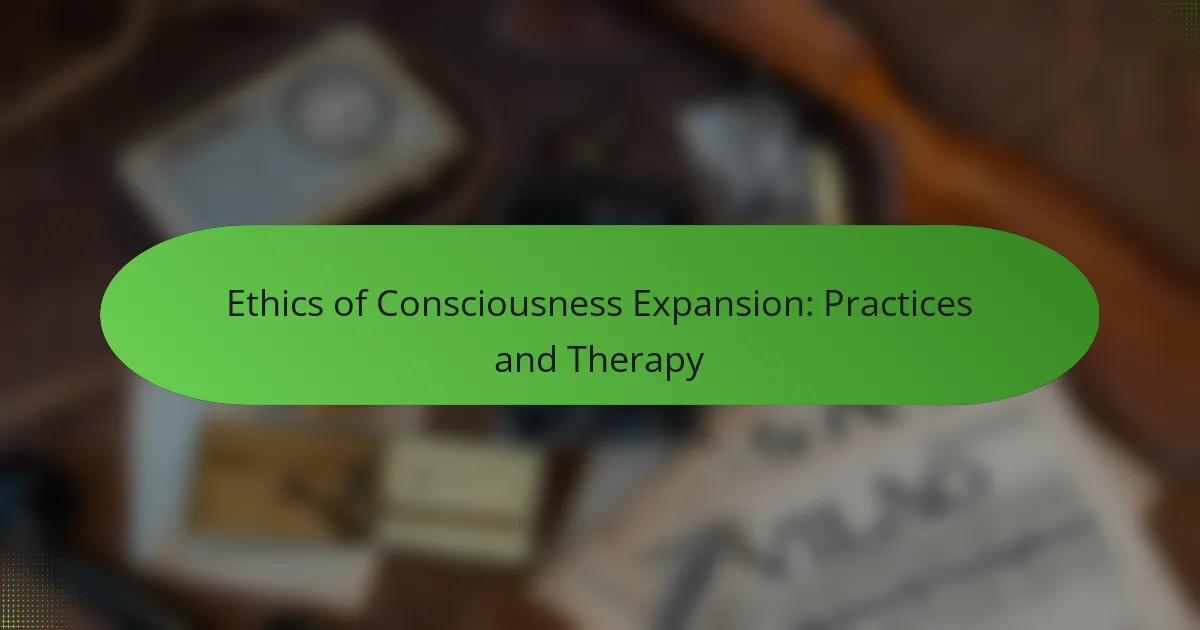Existentialism plays a pivotal role in shaping modern spirituality, particularly among young adults who are navigating the complexities of contemporary life. By promoting self-exploration and the pursuit of personal meaning, this philosophical framework encourages individuals to confront their beliefs and embrace authenticity, fostering deeper connections with themselves and the world around them.
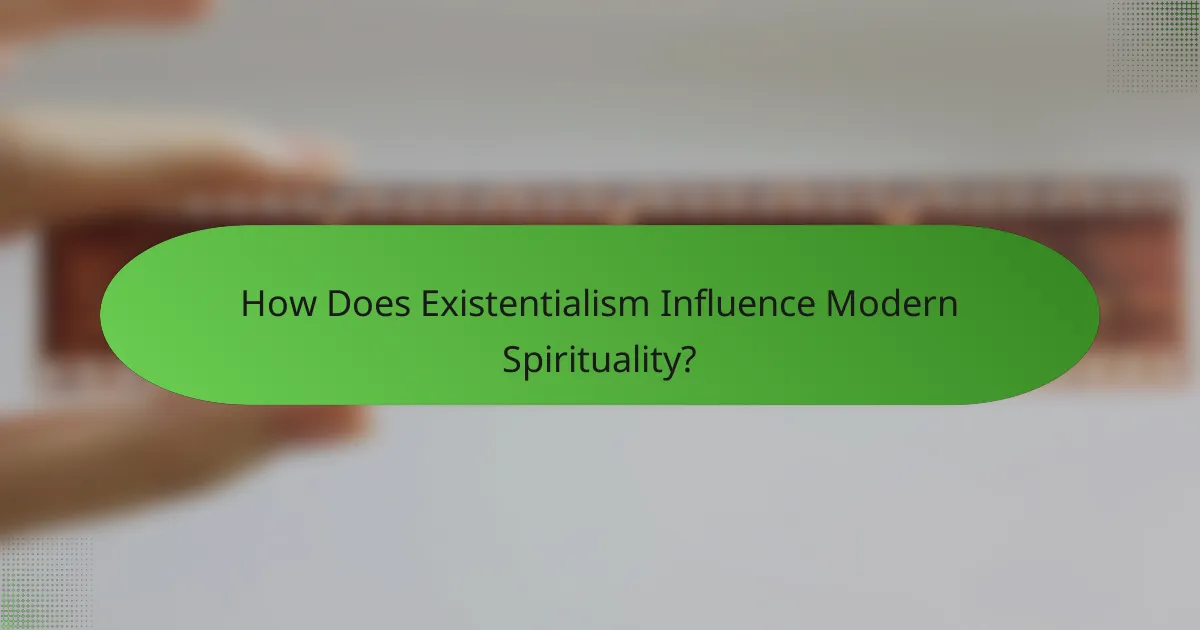
How Does Existentialism Influence Modern Spirituality?
Existentialism significantly shapes modern spirituality by encouraging individuals to find personal meaning and purpose in their lives. This philosophical approach promotes self-exploration and authenticity, resonating particularly with young adults seeking deeper connections in a rapidly changing world.
Emphasis on individual meaning
Existentialism places a strong focus on the individual’s quest for meaning, suggesting that each person must define their own purpose. This perspective empowers young adults to explore their values and beliefs, often leading them to create unique spiritual practices that reflect their personal experiences.
For example, rather than adhering to traditional religious doctrines, many young people may blend various spiritual elements, such as meditation, mindfulness, and nature appreciation, to cultivate a sense of fulfillment that resonates with their identities.
Integration of personal experiences
Modern spirituality influenced by existentialism encourages the integration of personal experiences into one’s spiritual journey. This approach values lived experiences as vital sources of insight and wisdom, allowing individuals to draw from their own life stories when seeking spiritual growth.
Young adults often share their journeys through social media, creating communities where they can discuss challenges and triumphs. This collective sharing fosters a sense of belonging and support, reinforcing the idea that personal experiences are central to spiritual development.
Rejection of absolute truths
Existentialism’s rejection of absolute truths invites individuals to question established beliefs and norms. This skepticism encourages young adults to critically assess traditional spiritual teachings and seek their own truths, which can lead to a more personalized and authentic spiritual path.
As a result, many young people may feel liberated to explore diverse philosophies and practices, often blending elements from various traditions to form a spiritual outlook that aligns with their individual perspectives and experiences.
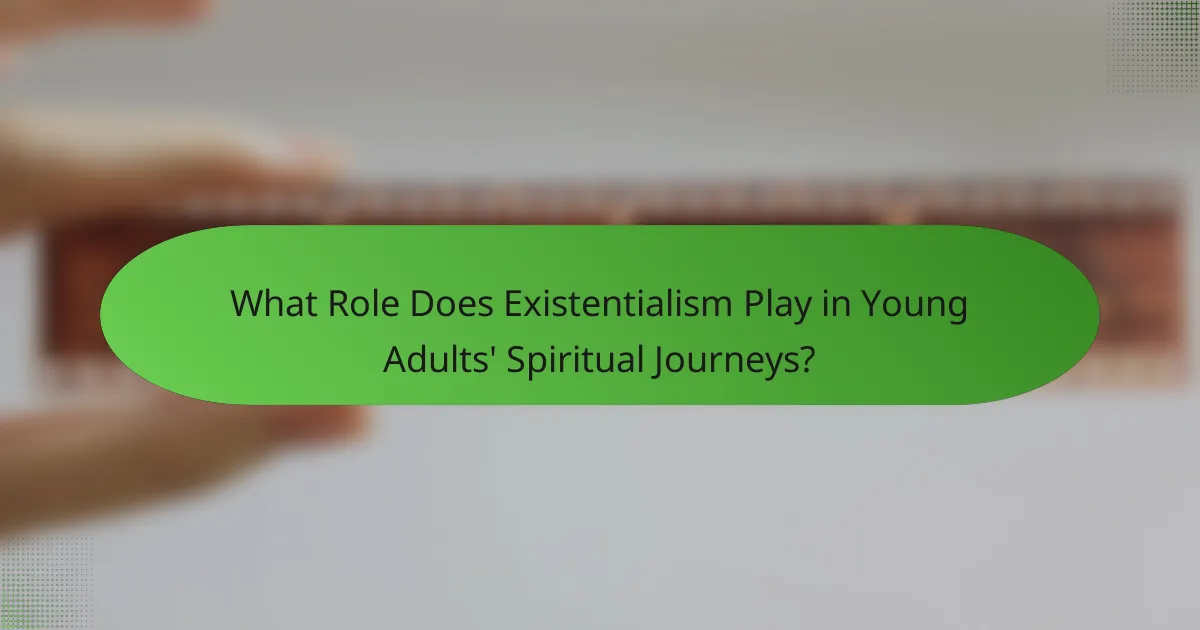
What Role Does Existentialism Play in Young Adults’ Spiritual Journeys?
Existentialism significantly influences young adults’ spiritual journeys by encouraging them to seek personal meaning and authenticity in their lives. This philosophical approach prompts individuals to confront their beliefs, values, and the nature of existence, guiding them toward a more profound understanding of themselves and their place in the world.
Search for authenticity
Young adults often grapple with the quest for authenticity, striving to align their actions with their true selves. Existentialism emphasizes the importance of personal choice and responsibility, motivating individuals to reject societal expectations and pursue paths that resonate with their inner values. This search can manifest in various ways, such as choosing unconventional careers or engaging in meaningful relationships.
To foster authenticity, young adults can reflect on their passions and interests, journaling or discussing them with trusted friends. This practice helps clarify their values and encourages them to take steps toward living authentically.
Struggles with identity
Identity struggles are common among young adults, often exacerbated by societal pressures and the existential quest for meaning. Existentialism invites individuals to explore their identities beyond labels and external definitions, promoting a deeper understanding of self. This exploration can lead to a more nuanced sense of identity that incorporates personal experiences and beliefs.
Engaging in self-reflection, seeking diverse experiences, and connecting with various communities can help young adults navigate their identity struggles. It’s essential to remain open to change, as identity can evolve over time.
Exploration of existential questions
Young adults frequently confront existential questions about purpose, freedom, and mortality, which can shape their spiritual beliefs. Existentialism encourages this exploration, suggesting that grappling with these questions can lead to personal growth and a more profound sense of meaning. This process often involves questioning inherited beliefs and considering alternative perspectives.
To effectively explore existential questions, young adults can engage in philosophical discussions, read relevant literature, or participate in workshops focused on personal development. These activities can provide valuable insights and foster a supportive environment for discussing life’s big questions.

How Can Young Adults Apply Existentialist Principles to Their Lives?
Young adults can apply existentialist principles by actively engaging in self-reflection, embracing uncertainty, and creating their own personal values. These practices encourage individuals to take responsibility for their choices and find meaning in their lives.
Practicing self-reflection
Self-reflection involves taking time to think critically about one’s thoughts, feelings, and actions. Young adults can benefit from journaling, meditation, or simply setting aside quiet time to contemplate their experiences and beliefs. This practice helps clarify personal desires and motivations.
To effectively engage in self-reflection, consider asking yourself questions like: What do I truly value? What are my strengths and weaknesses? Regularly revisiting these questions can lead to deeper insights and personal growth.
Embracing uncertainty
Embracing uncertainty means accepting that life is unpredictable and that not all questions have clear answers. For young adults, this can involve stepping outside their comfort zones and taking risks, whether in career choices, relationships, or personal pursuits. Acknowledging that uncertainty is a part of life can reduce anxiety and foster resilience.
To practice this, try to approach new situations with an open mind. Instead of fearing the unknown, view it as an opportunity for growth. This mindset shift can lead to richer experiences and a more fulfilling life.
Creating personal values
Creating personal values involves identifying what matters most to you and using those values as a guide for decision-making. Young adults should take the time to explore different philosophies, cultures, and belief systems to determine what resonates with them. This process can lead to a more authentic and meaningful life.
Consider making a list of your top five values and reflecting on how they influence your daily choices. This clarity can help you navigate challenges and align your actions with your beliefs, ultimately leading to a more cohesive sense of self.

What Are the Benefits of Existentialism for Young Adults?
Existentialism offers young adults valuable insights into personal identity, purpose, and the human experience, fostering growth and self-discovery. By embracing existentialist principles, they can navigate life’s uncertainties with a clearer sense of direction and meaning.
Enhanced self-awareness
Existentialism encourages young adults to reflect deeply on their beliefs, values, and choices, leading to heightened self-awareness. This introspection helps them understand their motivations and desires, allowing for more authentic decision-making.
Practicing mindfulness or journaling can enhance this self-awareness. For instance, dedicating a few minutes daily to reflect on personal experiences can reveal patterns in behavior and thought processes.
Improved coping mechanisms
Through existentialist thought, young adults learn to confront life’s inherent uncertainties and challenges, which can lead to better coping mechanisms. Accepting that life is unpredictable allows them to develop resilience in the face of adversity.
Techniques such as cognitive reframing can be useful. For example, viewing setbacks as opportunities for growth rather than failures can shift their perspective and reduce anxiety.
Greater resilience
Existentialism fosters greater resilience by teaching young adults to embrace their freedom and responsibility in shaping their lives. This understanding empowers them to face difficulties with a proactive mindset, rather than feeling victimized by circumstances.
Building resilience can involve setting realistic goals and maintaining a support network. Engaging with peers who share similar values can provide encouragement and reinforce a sense of community during challenging times.
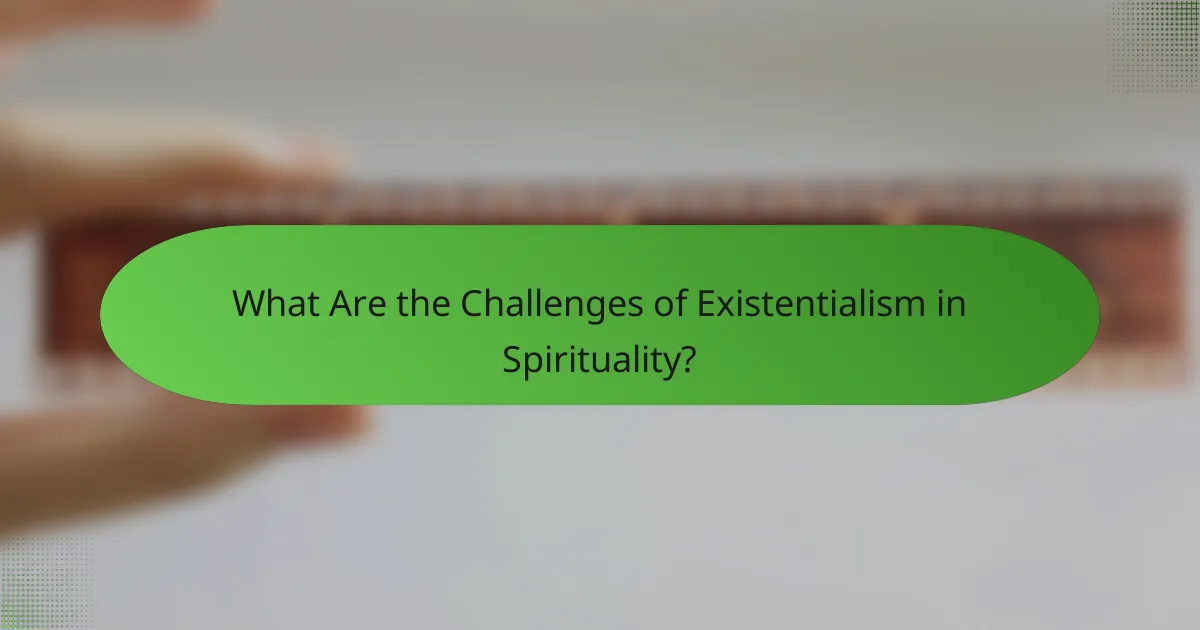
What Are the Challenges of Existentialism in Spirituality?
Existentialism presents several challenges in spirituality, particularly for young adults navigating their beliefs. These challenges include fear of nihilism, difficulty in finding community, and conflicts with traditional beliefs, all of which can complicate the search for meaning and connection.
Fear of nihilism
The fear of nihilism arises when individuals question the inherent meaning of life, leading to feelings of despair or hopelessness. This existential dread can be particularly acute among young adults who are still forming their worldviews and may struggle with the idea that life lacks purpose.
To combat this fear, it can be helpful to explore various philosophical and spiritual frameworks that offer alternative perspectives on meaning. Engaging in discussions, reading literature on existentialism, or participating in workshops can provide insights and reassurance.
Difficulty in finding community
Many young adults face challenges in finding a supportive community that aligns with their existential beliefs. Traditional religious groups may not resonate with their views, leading to feelings of isolation and disconnection.
To address this, consider seeking out alternative spiritual communities, such as discussion groups, online forums, or local meetups focused on existential philosophy. Building connections with like-minded individuals can foster a sense of belonging and shared exploration.
Conflicts with traditional beliefs
Existentialism often conflicts with established religious doctrines, creating tension for those raised in traditional faiths. This clash can lead to internal struggles as individuals reconcile their emerging beliefs with the teachings they grew up with.
To navigate these conflicts, it may be beneficial to engage in open dialogues with mentors or peers who understand both perspectives. Journaling or reflective practices can also help clarify personal beliefs and ease the transition between differing worldviews.
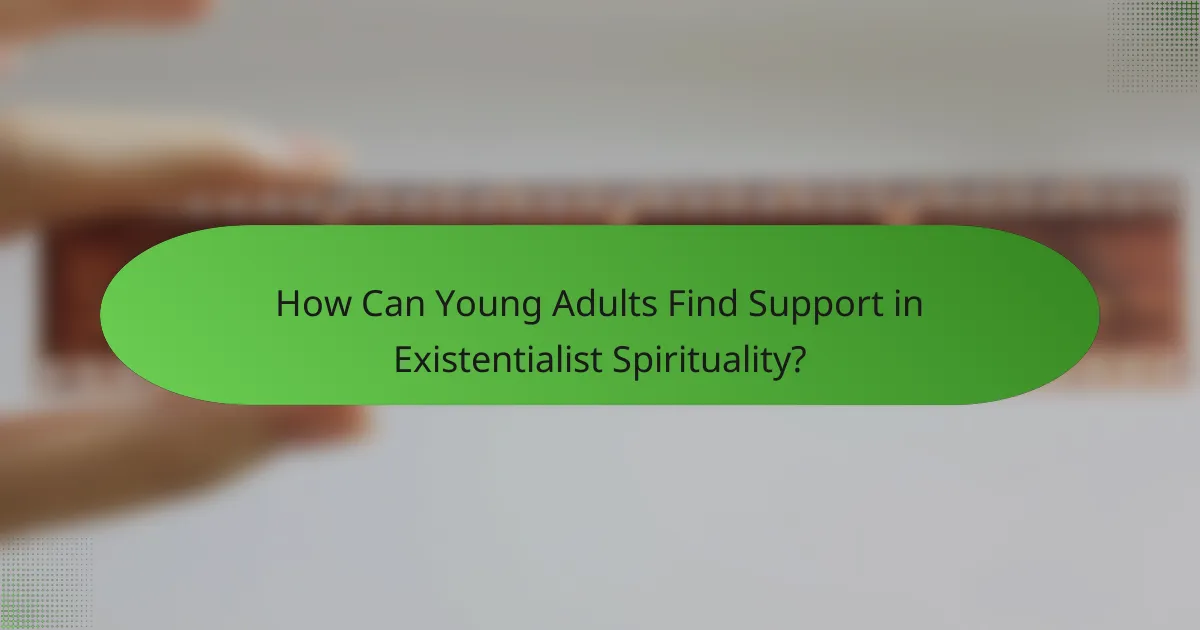
How Can Young Adults Find Support in Existentialist Spirituality?
Young adults can find support in existentialist spirituality by engaging with communities and resources that encourage exploration of meaning and personal values. This approach fosters a deeper understanding of their existence and helps navigate life’s uncertainties.
Joining discussion groups
Participating in discussion groups allows young adults to share their thoughts and experiences related to existentialist themes. These groups often provide a safe space for open dialogue, where individuals can express their feelings about purpose, freedom, and responsibility.
Look for local meetups or online forums focused on existentialism. Engaging with peers can help build a sense of community and reduce feelings of isolation, which is common among young adults exploring these concepts.
Engaging with existential literature
Reading existential literature is a powerful way for young adults to connect with the ideas of thinkers like Sartre, Camus, and Kierkegaard. These texts often challenge readers to confront their beliefs and assumptions about life, prompting personal reflection.
Consider starting with accessible works such as “The Stranger” by Albert Camus or “Existentialism is a Humanism” by Jean-Paul Sartre. Joining a book club can enhance this experience by providing a platform for discussion and deeper understanding.
Participating in workshops
Workshops focused on existential themes can offer practical tools for young adults to explore their spirituality. These sessions often include activities such as guided reflections, creative expression, and group discussions that encourage self-discovery.
Seek out workshops at local community centers, universities, or online platforms. Look for those that emphasize experiential learning, as they can provide valuable insights and foster connections with others on similar journeys.
